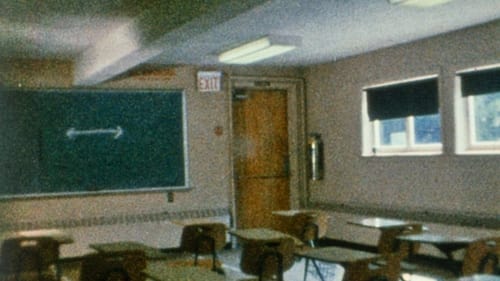YPOSTAS (2017)
Gênero :
Runtime : 8M
Director : Alexander Belinski
Sinopse
A man wanders. Available on demand from: ypostasfilm@gmx.com

A busted projector on an otherwise gorgeous day. Shot on 16mm.

Wolfgang Amadeus Mozart, according to his biographers (and his letters confirm this fact), was an extremely sensuous person, and Nachtstück (Nocturne) was intended to refer to this aspect of his personality: We glide into "Eine kleine Nachtmusik" a bit, then abandon standardized paths of conventional representational film and encounter a few seconds of passionate sensory filmæan example of something I would like to call "physical cinema." The thesis: Herr Mozart would have enjoyed it.

A depiction of a girl’s uneasy state of mind as it wavers between life and death.

An exploration of the ambiguities of documentary photographs which develops ideas triggered by a German pun. Worst Case Scenario starts out as a series of still photographs depicting daily life on a Viennese street corner. The film re-orders and manipulates a selection of these images, and as it progresses the static world slowly and subtly comes to life. As Sigmund Freud casts his long shadow across the city, an increasingly improbable chain of events and relationships starts to emerge.

Experimental filmmaker James Benning returns with this abstract documentary about California's Central Valley. Consisting of 35 shots, each over two minutes long, the film quietly portrays nature's subjugation to encroaching commercial interests. This film was screened at the 2000 Sundance Film Festival.

Viet Flakes was composed from an obsessive collection of Vietnam atrocity images, compiled over five years, from foreign magazines and newspapers. Schneemann uses the 8mm camera to “travel” within the photographs, producing a volatile animation.

"O'Neill found an envelope labeled 'Helen's Coreopsis' with seeds from a 1935 visit his mother had made to her sister in Nebraska. His film COREOPSIS was made by scratching into developed and discarded pieces of film stock revealing pink, yellow and clear layers. This remnant of his memory of her is performed and inscribed in these excised layers." - Erika Suderburg

EMULSION ELECTRONS IMBUED is part of a collection of films revolving around previously recorded cassette tapes. This film is the first in the series and originally shot on 16mm.

A play between the internal and external, an investigation between the printer and the optical effects of projection. One strip of super-8 film is reconstructed, taped onto 16mm and then re-photographed on the optical printer. The effluence, according to its new emulsion, becoming a reflection of its action.

In summer 2011, James Benning returned to his hometown of Milwaukee to make a third version of his seminal 1977 film 'One Way Boogie Woogie'. In 1977 he filmed 60 locations in Milwaukee’s industrial valley each for 60 seconds, creating short, minimal, playful narratives. In 2004 he remade the film as Twenty Seven Years Later, with the same 60 camera positions. This 2012 installation version, presents 18 locations similar to, and reminiscent of, the original.

A camera moves back and forth at an increasing pace. Back and forth, back and forth...

A musing is addressed to a glorious phantom-like entity.

From the south of France, a science fiction film about the end of the Leisure Class and that which came to replace it.

Snake grass lines a forest path. The camera passes toward the entrance to the woods. It staggers and repeats as the scene is saturated in colour.

A waterfall cuts through the land along the Bruce Trail; birdsongs and a distant cloud; I stand in the shadow of an electric cross; a bow set in the cloud, a token of the covenant between god and man.

Not a stage direction, but rather something very concrete is hidden behind the technical term. Something which betrays a little of the yearning for intelligent and playful dealings with the medium of short film…

A super-8 film shot on the east coast is brought west, bleached and splattered with paint. Remnants of home remain as frames and stills.

A film made for the Central Office of Information concerning Britain's coastline, with music by Michael Nyman.

"A night sky fills with light shimmers and flecks, surface markings, heavenly bodies. It’s an ocean, a well, a screen, a mirror, a portal. Blackness/void cluttered by growing ephemera. Dark reaches of outer and inner space gradually sifts through shards of granite and diamonds. The mind races as the material becomes greater and more frenetic, reaching a nearly audibly grinding pitch of excitement, flurry, and instantaneous infinity that ebbs at first and then maintains. Flashes of color emerge or are imagined. Chaotic flickering of dancing peasant girls and violently twisting astronaut helmets. Layers of sea slime over undulating life forms. Bonfires and celebration. Explosions, construction. Holocausts. Primordial ooze, modern civilization. Ages and seconds. Floating heads circle kaleidoscopic bursts of shiny beads. Everything everywhere twists, forces through, transforms into, overlaps everything else." - JT Rogstad, The International Exposition (TIE)

The video Tour Solaire begins by reversing the view: instead of measuring the remoteness of outer space, the view glides first from the observation platform of a disused observatory over Paris and then ultimately turns towards the interior of the tower. Overlaid by the soundtrack of Andrei Tarkovsky’s film Solaris, the camera moves through the abandoned observatory and then lingers on a few lifeless flies. The video is determined by scenarios veering between the suggestion of distance, the observation of concrete spaces and their details, the shift between inside and outside, between objectification and psychological interiors. The observatory appears here like a mute, unreal monument of an alien culture, like the instrument of a science beset by its own fictionalisation.















